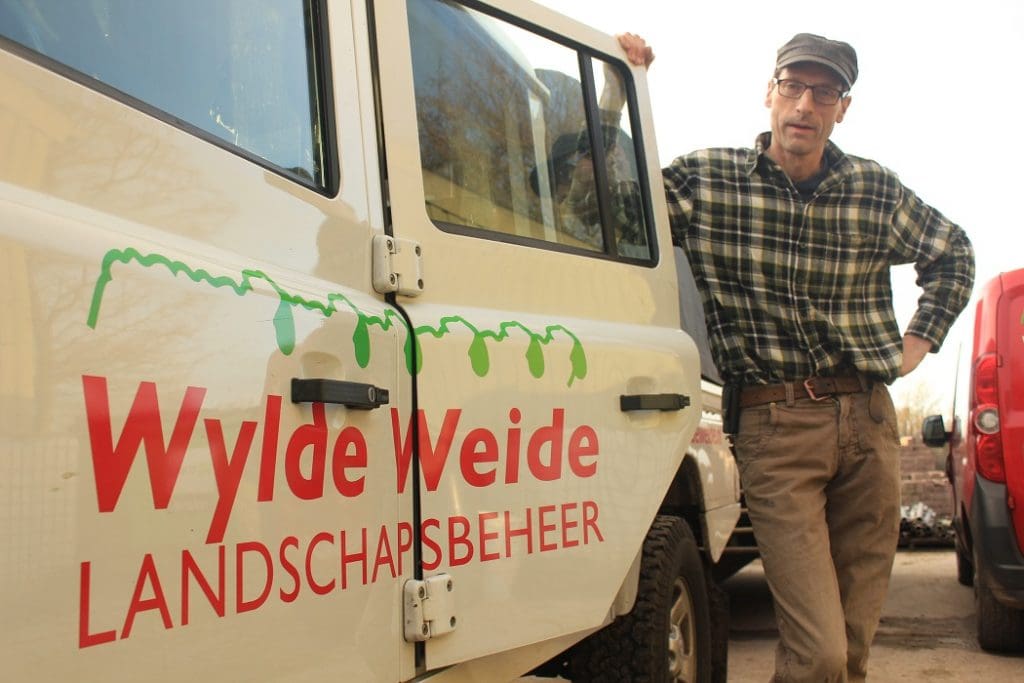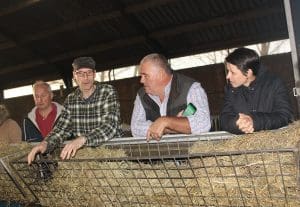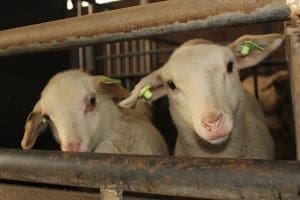
Diederik Sleurink from Wylde Weide Landschapsbeheer.
DIEDERIK Sleurink makes money when his sheep eat, but not primarily from the meat they produce, the subsidies they generate or from the wool they grow.
The Dutch sheep farmer operates a business call Wylde Weide Landschapsbeheer or Wild Meadow Landscape – using his sheep to improve the biodiversity of park areas throughout the northern Netherlands.
He told a group of visiting Victorian saleyard managers hosted by Litams director Hans van der Hoek that he would rather farm sheep to a model that improved the terrain than seek government subsidies to support his sheep.
“That’s where the money is, the meat and the wool are just by-products.”
Wool prices can be as low as 30 Euro cents a kilogram, so with a shearing cost of two Euros per sheep, sometimes he is just happy for the wool buyer to pick it up at his cost. The various crosses of heideschaap, or moorland sheep, some crossed with Suffolks, produce a coarse low-value fleece with lots of coloured fibres.

Litams owner Hans van der Hoek, left, with Diederik Sleurink, Horsham saleyard manager Paul Christopher and Ouyen saleyard manager Prue Lynch.
Diederik is one of a small group of sheep farmers paid by nature conservation organisations and city governments to graze sheep on public park and dike areas according to ecological principles. The controlled sheep grazing influences competition between grasses and flowering plants, encouraging associated wildlife such as butterflies, birds and lizards.
“In the cities they like that principle and also people like to see the sheep in the cities.”
The underlying principle is grazing for a short time and then giving vegetation a rest to alter competition in the sod. This leads to less grass and more herbs, creating more diversity. Flocks are sometimes grazed with a shepherd or by using temporary fencing, depending on the terrain or desired result.
The sheep have been shown to transport the seeds of plants in their fleece, hooves and in their manure from the one site to another. The seeds of up to 27 flowering plants have been found in their wool, staying for up to seven months in the fleece. The seeds from another 48 species were found in sheep hooves. A migratory flock is thus capable of dispersing seeds over more than 100 kilometres, conforming to the aim of restoring ecological corridors.
Sheep compete with dairy farming and geese
Diederik runs about 1100 ewes, but only a portion of them are mated each year, and he runs separate flocks in the nearby centres of Leeuwarden, Drachten and Meppel.
He has enough land to run 200 ewes on his home property and the rest are run in the landscape projects or on dairy land. The ewes are lambed down indoors.
“We have a lot of dairy farmers in this area and especially in the winter when it is too wet to have cows outside, you can use sheep to shorten the grass and stamp a bit on the ground and it makes it better for the grass.
“We deliver a nice service.”
Diederik said the dairy land agistment is usually free, apart from the period March until mid-April, when it is hard for him to find grazing for his sheep and he has to pay to agist his flocks.
“Because now it is growing and they want to have manure on it and they want to get rid of me.
“It needs a lot of diplomacy, planning and improvising.”

Curious Wylde Weide lambs.
Apart from the difficulty finding cost-effective grazing during winter, sheep farmers in some area also have to contend with migratory geese, competing for the grass. Shooting the geese is not a preferred option. More than 2 million geese spend the winter in the Netherlands every year.
“In Australia it would be easy, but when you have a lot of people living in the city and they want save every animal, also all the geese.
“We have a lot of water and a lot of grass, mature dark green grass with protein, so they are well-fed when they go on, sometimes they find it so nice here they never go away.”



HAVE YOUR SAY